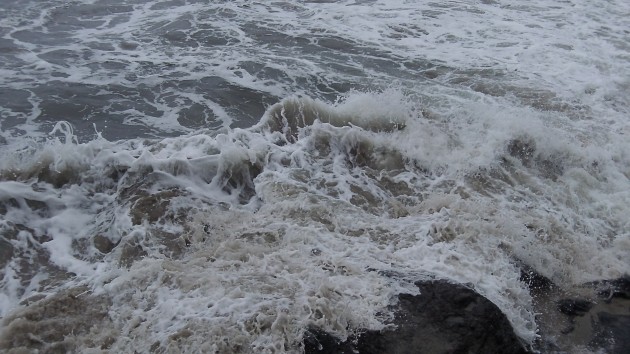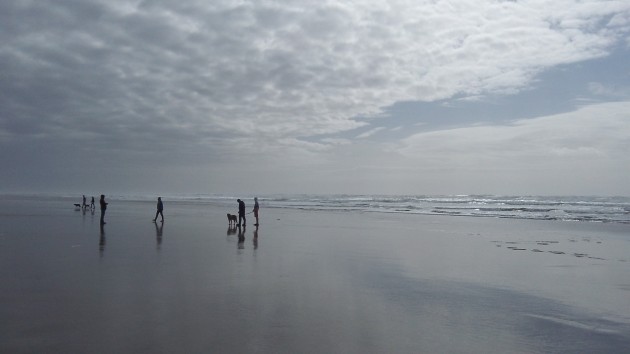On Thursday afternoon on the central Oregon coast, it actually looked as though the sea level had taken a sudden jump.
So, were we seeing the oft-predicted rise in the level of the oceans because of climate change? Hardly. It was a high tide, and the high tide was pushed a little farther up the beaches and the rocks than usual because a stiff southwest breeze piled up a fairly respectable system of waves.
Even though sea level rise because of global climate change seems to be in the newspapers and on TV every other week, this is mainly because somebody is driving the agenda. Nothing much is really happening. The reports are about predictions and models. The general reader has no way to dispute them. And the notion that we’re somehow threatened by a gradual increase in mean sea level can sound nice and ominous. So it’s a fine yet safe thing to cover on a day when a new “study” has come out and things are otherwise slow.
The news would be more factual and less speculative — and probably more interesting — if we covered things that could be observed and demonstrated to be true.
And as for warming? I don’t know about the globe, but on the beach it was, finally, even in the wind, almost warm. (hh)


No matter how high the tide has been, it always goes out again.


It’s amazing how whenever there’s some so-called “crisis” Dems run around with their heads in a tizzy yelling for more taxes and more government control. “Never let a crisis go to waste” is the famous mantra of Rahm Emauel and Dems have learned that fear mongering and screaming “crisis” is often enough to get people to part with their money.
Man made global warming is just one of many, many lies used by the left to enable their utopian vision of government control over everything. They didn’t count on people waking up to that truth though and now “the chickens are coming home to roost”….
Man made global warming is a lie. Always has been…
We really need the oceans to get back up to where they are supposed to be.
Awful convenient for a bunch of old codgers to ignore the threat man poses to the environment. I get it, you guys already got yours so no need to worry about the next generation that has to deal with the problems. It is an incredibly selfish outlook, but I get it.
That’s one way of looking at it. The other is that we try to keep the coming generations from suffering in poverty and misery because we’ve ceded all economic freedom in the interest of preventing a change that, most likely, cannot be prevented and in any case is not particularly dire, especially if prudent preparations are made. (hh)
HH
That’s the first well-phrased viewpoint I’ve seen from the con-side of the climate debate.
The key element to both positions is “prudent preparations”. Please bear in mind that I spent my professional career reducing cost by eliminating waste. The single largest waste area was fuel consumption.
So, here’s a prudent preparation to consider — how will we cook our food when the trees are ashes and the petro fuels are too depleted to harvest?
Solar, wind, and hydro (whichever of those still work) with backup from home and business battery storage and probably nuclear. Very important: the smart grid to manage everything and dynamic pricing which provides the incentive for everyone to conserve when needed and install batteries.
Hasso’s “prudent preparations” will save all of Oregon except the parts that ought to be abandoned anyway due to tsunami hazard. The billion or more people that live in low-elevation coastal areas around the world will need other arrangements.
We’ll be happier and healthier when “the petro fuels are too depleted to harvest” (wonderful phrase) because the biggest obstacle to bicycle-almost-everywhere will be greatly reduced. Cars will be a rare luxury, with automatic crash avoidance, confined to a minority of streets for normal-speed thru traffic. When non- and minimally-motorized transportation reaches the critical mass needed for full respect, then all the bridges and pathways to connect everything will be built at a small fraction of the cost of obsolete petro-fueled infrastructure. Whole carfree cities can be built inside abandoned cloverleafs.
Right now, we are in a strange time when food and energy are too cheap, causing waste, obesity, laziness, thoughtlessness, and ultimately unhappiness. The current petro glut and low prices may end sooner than most people think, aided by the resurgence of large vehicles and fairly inelastic demand for fuel. When we finally reach petro-depletion, accelerated by the last gasp of fracking, necessity will drive the political will to alternate means of moving around the world. My biggest sadness is that I’m not young enough to enjoy the better future that unimaginative people dread.
“…and in any case is not particularly dire, especially if prudent preparations are made.”
Whether or not it is “dire,” obviously is dependent on point of view. However, any “prudent preparations” do require anticipating the future and somehow paying for the changes necessary to be make that case. Any ideas as to how those should be paid for?
Windfall profits tax.
No matter how dire, everything generates winners, not just losers. Might even mitigate the anger (and consequent irrationality) caused by increasing inequality.